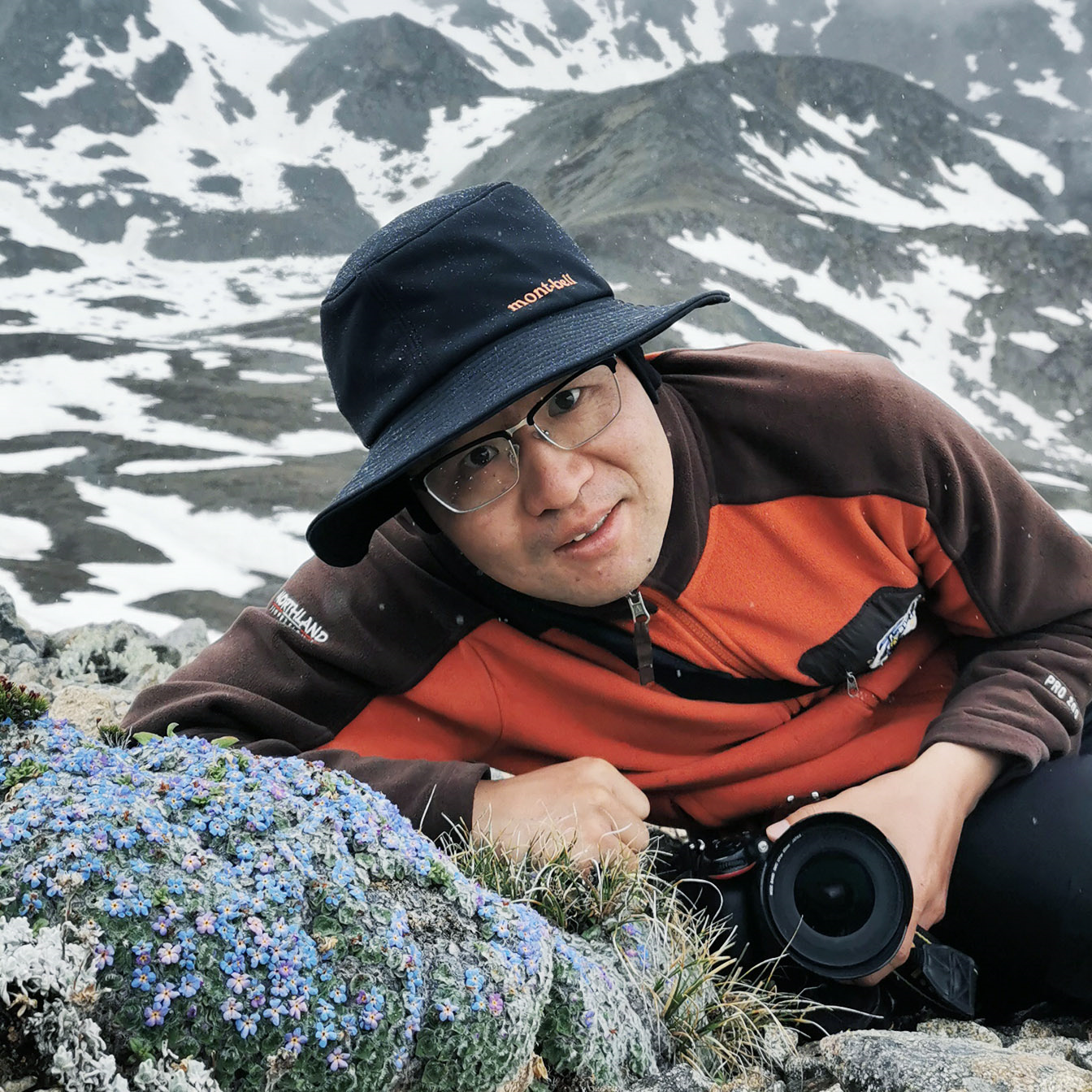Areas of Focus
- Evolution of Plant Coloration
- Plant Reproductive Strategies
Work Experience
- 2020-11~Present - Kunming Institute of Botany, Chinese Academy of Sciences - Researcher
- 2018-10~2020-11 - Kunming Institute of Botany, Chinese Academy of Sciences - Associate Researcher
- 2017-10~2018-10 - University of Exeter - Visiting Scholar
- 2016-01~2017-10 - Kunming Institute of Botany, Chinese Academy of Sciences - Associate Researcher
- 2012-02~2016-01 - Kunming Institute of Botany, Chinese Academy of Sciences - Assistant Researcher
Academic Background & Achievements
- 2006-09--2012-01 PhD: Kunming Institute of Botany, Chinese Academy of Sciences
- 2002-09--2006-07 Bachelor's: Beijing Forestry University
Publications
- Plant camouflage: ecology, evolution, and implications, Niu, Yang, Hang Sun, and Martin Stevens, 2018
- Grey leaves in an alpine plant: a cryptic colouration to avoid attack?, Niu, Yang, Gao Chen, De‐Li Peng, Bo Song, Yang Yang, Zhi‐Min Li, and Hang Sun, 2014
- Alpine scree plants benefit from cryptic coloration with limited cost, Niu, Yang, and Hang Sun, 2014
- Divergence in cryptic leaf colour provides local camouflage in an alpine plant, Niu, Yang, Zhe Chen, Martin Stevens, and Hang Sun, 2017
- Commercial harvesting has driven the evolution of camouflage in an alpine plant, Niu, Yang, Martin Stevens, and Hang Sun, 2021
- Camouflaged plants are shorter than non-camouflaged plants in the alpine zone, Huang, Tao, Zhe Chen, Bo Xu, Hang Sun, and Yang Niu, 2023
- Red fruits exhibit lower colour diversity than red flowers as perceived by birds, Chen, Zhe, O. Nevo, K. Valenta, Hang Sun, and Yang Niu, 2023
- The ultraviolet colour component enhances the attractiveness of red flowers of a bee-pollinated plant, Chen, Zhe, Chang-Qiu Liu, Hang Sun, and Yang Niu, 2020
- Red flowers differ in shades between pollination systems and across continents, Chen, Zhe, Yang Niu, Chang-Qiu Liu, and Hang Sun, 2020
- Intraspecific floral colour variation in three Pedicularis species, Zhang, Qiu-Yu, Zhe Chen, Hang Sun, and Yang Niu, 2023
- Visual function of red staminal filaments in a bee-pollinated plant, Hu, Ya-Li, Zhe Chen, Jian-Jun Zhao, Yang Niu, and Gang Xu, 2022
- Survival and reproduction of plant species in the Qinghai–Tibet Plateau, Sun, Hang, Yang Niu, Yong‐Sheng Chen, Bo Song, Chang‐Qiu Liu, De‐Li Peng, Jian‐Guo Chen, and Yang Yang, 2014
- Historical development of karst evergreen broadleaved forests in East Asia has shaped the evolution of a hemiparasitic genus Brandisia (Orobanchaceae), Chen, Zhe, Zhuo Zhou, Ze-Min Guo, Truong Van Do, Hang Sun, and Yang Niu, 2023
- Floral closure induced by pollination in gynodioecious Cyananthus delavayi (Campanulaceae): effects of pollen load and type, floral morph and fitness consequences, Niu, Yang, Yang Yang, Zhi-Qiang Zhang, Zhi-Min Li, and Hang Sun, 2011
- A sexually dimorphic corolla appendage affects pollen removal and floral longevity in gynodioecious Cyananthus delavayi (Campanulaceae), Niu, Yang, Zhi-Qiang Zhang, Chang-Qiu Liu, Zhi-Min Li, and Hang Sun, 2015
- Function of male and hermaphroditic flowers and size-dependent gender diphasy of Lloydia oxycarpa (Liliaceae) from Hengduan Mountains, Niu, Yang, Qiangbang Gong, Deli Peng, Hang Sun, and Zhimin Li, 2017
- Intersexual mimicry and imperfect deceit of a threatened aquatic herb Ottelia acuminata, Yang, Jing, Yang Niu, Wei‐Bang Sun, Xiang‐Hai Cai, and Gao Chen, 2022
- Post-floral erection of stalks provides insight into the evolution of fruit orientation and its effects on seed dispersal, Niu, Yang, Zhuo Zhou, Wen Sha, and Hang Sun, 2016
- Sexual allocation in the gynodioecious species Cyananthus macrocalyx (Campanulaceae) at high elevations in the Sino-Himalaya Mountains, Chen, Jian-Guo, Yang Niu, Yang Yang, and Hang Sun, 2016
- Sex allocation in gynodioecious Cyananthus delavayi differs between gender morphs and soil quality, Chen, Jianguo, Yang Niu, Zhimin Li, Yang Yang, and Hang Sun, 2017
- Phylogenetic and biogeographic analyses of the Sino-Himalayan endemic genus Cyananthus (Campanulaceae) and implications for the evolution of its sexual system, Zhou, Zhuo, Deyuan Hong, Yang Niu, Guodong Li, Zelong Nie, Jun Wen, and Hang Sun, 2013
- Sexual conflict in protandrous flowers and the evolution of gynodioecy, Wang, Hao, Spencer CH Barrett, Xue‐Yan Li, Yang Niu, Yuan‐Wen Duan, Zhi‐Qiang Zhang, and Qing‐Jun Li, 2021
- Woolly and overlapping leaves dampen temperature fluctuations in reproductive organ of an alpine Himalayan forb, Peng, De-Li, Yang Niu, Bo Song, Jian-Guo Chen, Zhi-Min Li, Yang Yang, and Hang Sun, 2015
- Papilio butterfly vs. hawkmoth pollination explains floral syndrome dichotomy in a clade of Lilium, Liu, Chang-Qiu, Yang Niu, Qing-Biao Lu, Zhe Chen, Bo Cai, Ye Fang, and Yun-Dong Gao, 2022
- Are superior ovaries damaged by the bills of flower-visiting birds and does this preclude adaptation to bird pollinators?, Liu, Chang-Qiu, Yang Niu, De-Li Peng, and Hang Sun, 2018
- Floral adaptations of two lilies: implications for the evolution and pollination ecology of huge trumpet‐shaped flowers, Liu, Chang‐Qiu, Yun‐Dong Gao, Yang Niu, Ying‐Ze Xiong, and Hang Sun, 2019
- Mystery revisited: Is nocturnal colored nectar a nonadaptive floral trait?, Cai, Xiang‐Hai, Bao‐Bao Shi, Yang Niu, Jia Ge, Guillaume Chomicki, and Gao Chen, 2022
Awards
- Yunnan Provincial Natural Science First Prize (2023): First Prize
- Yunnan Youth Science and Technology Award (2022): Provincial Level





